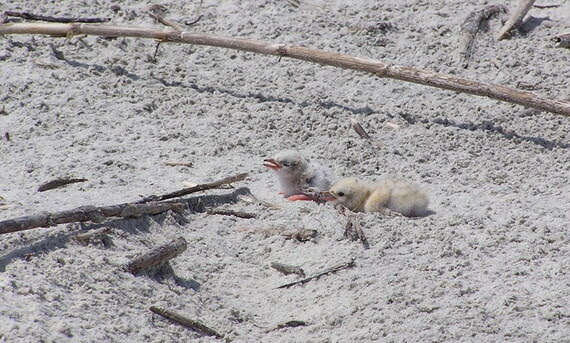
Georgia beaches are not only vacation destinations, they are prime spots for nesting shorebirds and seabirds and for migrating species feeding for long flights to the Arctic.
American oystercatchers, Wilson’s plovers and least terns use sites such as Little Tybee Island, Ogeechee Bar, East Beach on St. Simons Island, Cumberland Island and the southern end of Jekyll Island. Among other species, black skimmers, royal terns and gull-billed terns also nest on Georgia beaches, offshore sandbars and dredge spoil islands.
For these nesting birds, human disturbance is a significant threat. Shorebirds and seabirds also face risks from native predators and high spring tides. Pets can be destructive, too, killing or scaring birds.
Visitors to Georgia’s beaches can help beach-nesting birds and migrating species by:
- Avoiding posted sites. (Eggs and chicks are camouflaged and easy to overlook or even step on.)
- Walking below the high-tide line.
- Watching beach birds only from a distance.
- Backing away from any nesting birds they accidentally disturb.
Adults frightened from a nest will often call loudly and exhibit distraction displays, such as dragging a wing as if it’s broken. Sometimes the birds will dive-bomb people who get too close to their nest, said wildlife biologist Tim Keyes of the Georgia Department of Natural Resources. Paying attention to the behavior of birds will alert you are too close to a nest or chick.
Keyes also encouraged visitors to leave dogs at home or keep them on a leash when visiting a beach where dogs are allowed. “Dogs and beach wildlife are incompatible,” Keyes said.
Pets are excluded by regulation or law at sites including Tybee Island, Little Tybee Island, Satilla Marsh Island, Jekyll’s south end and St. Catherines and Little Egg Island bars. (The bars and Brunswick Dredge Island, another key nesting site, are also closed to people.)
Beach-nesting birds nest above the high-tide line on wide, terraced beach flats or on the edge of dunes. In Georgia, the birds lay eggs in shallow scrapes in the sand from mid-March through July. After hatching, chicks hide on the beach or in the grass.
Disturbance by people or pets can cause adult birds to abandon eggs and chicks, exposing them to heat and predators. On a hot day, “in as little as 10 minutes, the eggs can be cooked,” Keyes said.
The threats are similar for migrating seabirds and shorebirds. The coast provides vital stopover sites for species such as federally threatened red knots flying from South America and the Arctic. Red knots flushed from feeding might not gain the weight needed to survive their more than 9,000-mile migration.
“With a little bit of effort and concern, we all can enjoy the beach,” said Keyes, who works for the DNR Wildlife Resources Division’s Wildlife Conservation Section.
The effort is worth it. Already this year, pairs of American oystercatchers and Wilson’s plovers have been documented on St. Simons’ East Beach and a bar in Gould’s Inlet, at the north end of the popular beach. Signs were recently posted to help protect the areas. DNR has also documented brown pelicans nesting very early, and already on eggs, on Brunswick Dredge Island, also dubbed Bird Island, in Brunswick Harbor.
A Beach Stewards program powered by volunteers helps monitor least terns nesting on East Beach. Participants inform the public and steer dogs and beachgoers away from the roped-off colony. Interested in being a Beach Steward? Contact Keyes, (912) 222-0424 or tim.keyes@dnr.ga.gov.
As with all migratory bird species, shorebirds and seabirds in Georgia are protected by the federal Migratory Bird Treaty Act. Some species, such as piping plovers and red knots, have additional protections under the Endangered Species Act.
Because of damage caused at many of Georgia’s offshore bars by hurricanes, large storms and sea-level rise, DNR is also working on projects to enhance or add nesting habitat through small-scale restoration projects, such as creating dredge spoil islands in collaboration with the U.S. Army Corps of Engineers. The National Fish and Wildlife Foundation and the Georgia Ornithological Society have both provided funding in support.
Keyes urged people visiting Georgia’s coast to help protect shorebirds, seabirds and migrants. “Let’s all do our part to ensure these birds can make the most of the vulnerable habitat available to them.”
DNR’s Wildlife Conservation Section works to conserve Georgia wildlife not legally fished for or hunted, as well as rare plants and natural habitats. The agency depends primarily on fundraisers, grants and contributions. That makes public support critical.
Georgians can help by contributing to the state’s Nongame Wildlife Conservation Fund. Here’s how:
- Buy a DNR eagle or monarch butterfly license plate, or renew any of the older designs, including the hummingbird tags. Most of the fee is dedicated to wildlife. Upgrade to a wild tag for only $25! Details at georgiawildlife.com/licenseplates.
- Donate at gooutdoorsgeorgia.com. Click “Licenses and Permits” and log in to give. (New customers can create an account.) There’s even an option to round-up for wildlife.
- Donate directly to the agency. Learn more at georgiawildlife.com/donations.
Visit georgiawildlife.com/conservation/annualreport to see how support is put to work for wildlife.
Beach Bird Tips
How can you help birds when visiting a Georgia beach?
• Stay in high-traffic areas; birds are less likely to nest where crowds gather.
• Walk below the high-tide line or on wet-sand beaches.
• Avoid posted nesting sites. (Eggs and chicks are camouflaged and easy to overlook or even step on.)
• Observe beach birds only from a distance. Back away from any nesting birds you accidentally disturb. (Adults frightened from a nest will often call loudly and exhibit distraction displays, such as dragging one wing as if it is broken.)
• If you see people disturbing nesting birds, respectfully tell them how their actions can affect the birds. If the people continue, contact DNR’s Law Enforcement hotline, (800) 241-4113 or rangerhotline@dnr.ga.gov.
• Leave dogs at home or keep them on a leash when visiting a beach where they are allowed. (Owners who let their dogs chase shorebirds can be fined for harassing protected species.)
• Keep house cats indoors, and don’t feed feral cats. Cats often prey on birds.
• Help spread the word through family, friends and social media about the importance of giving beach-nesting birds the space they need to thrive.
Beach-nesting bird tips and video are available at georgiawildlife.com/conservation/birds (click “Share the Beach”).

1 Comment
Leave a Reply
Cancel reply
Leave a Reply

Chattooga Schools
GNTC Basic POST Certification graduation held July 22

Bulloch Public Safety
07/25/2024 Booking Report for Bulloch County

Chattooga Schools
Chattooga County Schools: Superintendent Helie’s Welcome Letter

Chattooga Local News
Fall Armyworms Confirmed in Northwest Georgia Counties

Chattooga Schools
Entrepreneur seeks degree at GNTC

Bulloch Public Safety
07/08/2024 Booking Report for Bulloch County

Bulloch Public Safety
07/22/2024 Booking Report for Bulloch County

Bulloch Public Safety
07/02/2024 Booking Report for Bulloch County

Bulloch Public Safety
07/16/2024 Booking Report for Bulloch County

Bulloch Public Safety
07/03/2024 Booking Report for Bulloch County




Linda Smith
April 21, 2023 at 6:26 pm
On a spontaneous and much regretted trip to Savannah, and Tybee Island March 18, 2023, my husband and I walked down the beach toward the peer with the large gazebo at the beginning of it. I delighted in seeing the pigeons mating rituals as well as our native black birds teaching their babies to fly. I am a birder, so I am very much aware that a black bird’s babies are brown and roughly the same size as an adult. Well, some of your fishing locals don’t seem to be as well educated and were knocking the babies off the railings to drown in the hook infested waters around your peers. I saw there was a sink there for scaling fish – an encouragement to further damage beach life. Here’s a fantastic idea that goes right along with the massive laundry list of things you can’t bring onto the beach: NO FISHING FROM THE BEACH OR THE PEERS. I would have instantly leaped over the railing and into the water to save the baby birds from ignorant red necks, had there not been a sign warning not to go within 150 ft of the peer. I assume because there are endless sharp hooks and plastic fishing line to get tangled up in. I’ve never been in those waters, I’d never been to Savannah. If it were Florida, I would never have hesitated to jump in. But GA allows fisherman to ruin ocean and shore life with no repercussions. Cruelty to animals is a crime. And if ignorance is the biggest factor maybe we should worry a lot less about dog pee or cigarette butts, and actually save aquatic lives by making fishing banned unless you’re in a boat and 3 miles minimum, out at sea. If you know the right person for me to send this to please advise. Thank you.